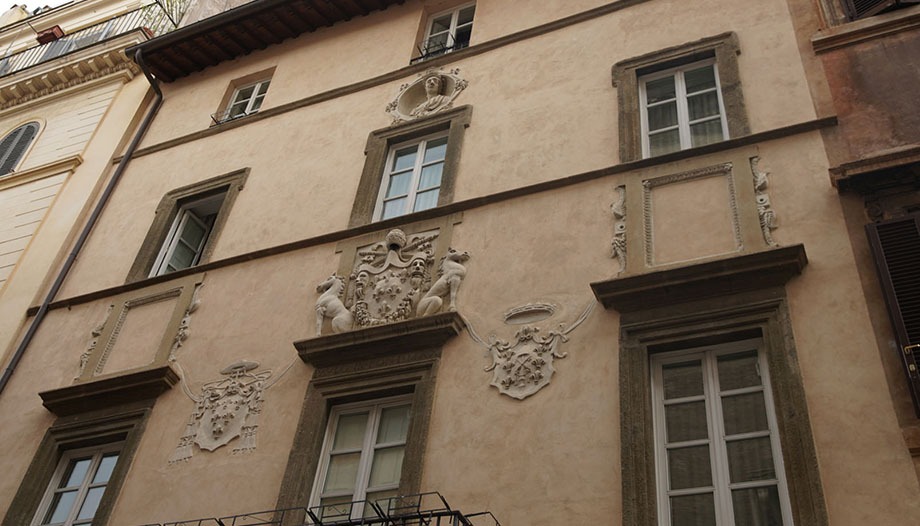The city of Rome has a long tradition of hosting institutions representing European countries. Over the centuries, the Pope's city has been a world capital between the political and the religious, a true point of reference for a long series of generations; thus, institutions that constituted a national presence, expressed by the governments of the time, mostly of a monarchical nature, have come to Rome.
Spain has been institutionally present in Rome since the eleventh century, and this presence has not been lacking since then. Obra Pia Stabilimenti Spagnoli in Italy. Thus, we have a private non-profit organization based in Rome, which develops social, cultural, artistic and heritage protection and conservation initiatives. It is entrusted to the Spanish Embassy to the Holy See and operates under "diplomatic protection".
History of the Pious Work
It began in the 11th century at the time of the Opera Pia of Castile; it founded a church of St. James next to the Colosseum, which at the beginning of the 14th century (the management had passed to the Opera Pia of Aragon) was incorporated into St. John Lateran. This church survived until 1815, when it was demolished. This presence in Rome originated from a series of testamentary dispositions and foundational contributions of Spanish citizens and entities that, for religious, charitable and welfare reasons, attended these Opere Pie.
In the 15th century the church of Our Lady of the Sacred Heart was built in the center of the city, in Piazza Navona, on the initiative of Don Alfonso de Paradinas, canon of the cathedral of Seville, who had the building completely rebuilt at his own expense. For centuries it was the showcase of the Spanish presence in the papal city, until in 1818 this church was abandoned by the Spaniards, who settled in Santa Maria de Monserrat, now the National Church of Spain.
Structure of the institution
The presidency, legal representation and management of Opera Pia Stabilimenti Spagnoli In Italia are the responsibility of the Spanish Ambassador to the Holy See, who acts under the title of Governor of Opera Pia.
As a collegiate body of government and administration, there is a Board, composed of the Governor as President, the Minister Counselor as Vice President and five members: the Rector of the National Church of Santiago and Montserrat, the Rector of San Pietro in Montorio, two Spaniards residing in Rome, appointed by the Board at the proposal of the Governor, and a diplomat from the Spanish Embassy to the Holy See, who acts as Secretary. All members must be Spaniards and serve in an honorary and gratuitous capacity.
Today's activities
At present, the Obra Pía is in charge of the support of the National Church of Santiago and Montserrat, of the ecclesiastical tasks inherent to it and of the cultural activities of its attached Center of Ecclesiastical Studies. It is also in charge of the Pantheon of the Spaniards in the cemetery of Rome and ensures the fulfillment of the different fundamental, religious, charitable or welfare purposes of the pious works that generated it.
At the same time, he is in charge of studying possible aids for the religious activity of San Pietro in Montorio. This church stands on what in the fifteenth century was a set of lands and orchards bought by King Ferdinand the Catholic and in which a small convent was built, traditionally entrusted to the Franciscan order, and the church, which is still open for worship. In one of its cloisters is the famous temple of Bramante, considered the architectural manifesto of Renaissance classicism.
Health care
For several centuries, religious activities have been flanked by health initiatives, initially aimed at people of Spanish nationality, then the Opera Pia developed its initiatives in other places in Rome, Palermo, Naples, Assisi, Turin and Loreto. Today, thanks to the support of a historical heritage, it is able to meet the needs of many elderly people and families in social emergency through the work of the Sisters of the Cross of Rome, an institution founded by St. Angela of the Cross in 1875.
It also supports religious orders that promote the work of women in society, such as the Teresian Sisters of Palermo, an institution founded by St. Anthony Poveda in 1911, in addition to promoting various cultural initiatives (concerts, exhibitions, publication of magazines, etc.). .) and the preservation of historical heritage, through the development of restoration projects. The Opera Pia collaborates with the Little Sisters of the Homeless Elderly in the construction of a building that will house a residence for 50 elderly women and the main center of the Order in the Holy See.
Assistance to families in social emergency situations
Again through the direct support of the Sisters of the Company of the Cross, Opera Pia supports the needs of 150 families in Rome, families in situations of social emergency, extreme poverty or illness, supporting various social causes for the elderly and young people.









